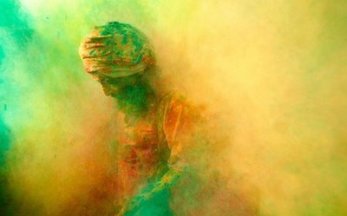 Here is a tale of a child raised by his widowed mother in the time of the great Hasan al-Basri. She was a pious, devout Muslim who would regularly attend Imam Hasan’s Quran dars. She valiantly tried to raise her son on the correct path, but unfortunately when he reached the age of adulthood, he gained control of his inheritance and fell in with the wrong crowd. With seemingly limitless funds at his disposal, he sinned his youth away. And all throughout, his mother, a devout servant of Allah (swt), would constantly implore him to return to the right path. But he constantly refused, choosing instead to follow his nafsi whims and desires.
Here is a tale of a child raised by his widowed mother in the time of the great Hasan al-Basri. She was a pious, devout Muslim who would regularly attend Imam Hasan’s Quran dars. She valiantly tried to raise her son on the correct path, but unfortunately when he reached the age of adulthood, he gained control of his inheritance and fell in with the wrong crowd. With seemingly limitless funds at his disposal, he sinned his youth away. And all throughout, his mother, a devout servant of Allah (swt), would constantly implore him to return to the right path. But he constantly refused, choosing instead to follow his nafsi whims and desires.
Many times she brought him to Hasan al-Basri, who would calmly and politely admonish him, but to no avail. Even the words of the great Imam could not bring about the desired affect. Years passed and Imam Hasan grew to tire of his wayward shenanigans and resolved that maybe Allah (swt) had simply not written for the boy to be guided. Yet, the mother remained steadfast, as only a mother could, in her wishes to reform her one and only child.
Every morning, when he would return from his nights of mischief, she would call on him to make amends with his Creator and return to the path of righteousness. As he got older and due to the effect of his foolhardy ways, sickness befell him and he became bedridden. Having squandered his wealth, seeing the weakness of his once sturdy body, and with death lingering around the corner, only then did he realize the error of his ways.
His unrelenting mother was by his bed, reminding him that it was never too late to repent. Even though his worldly life was wasted, he still had the chance to salvage his afterlife with sincere atonement, she repeated to him. Sensing his mortality, his heart finally softened and he responded with a query, “After a life of sin, I don’t know how to repent. Can we go to Imam Hasan?” Sensing a bit of hope, she excitedly replied, “My dear son, you are too sick to walk and I am too old to carry you, but I will rush and beckon him to come here.”
When she reached him and requested his company with her son, he remembered the countless failed efforts and quickly wrote him off, “My dear sister, I have the Quran lesson for which I must prepare. Over a thousand students will come and I owe it to them to properly present my lesson. Besides, your son has consistently ignored my advise, rejected any efforts to reform and basically rejected the message of Islam so many times that I fear he is beyond assistance. “Should I not spend my time for those who are coming to seek the knowledge, who have shown a keen interest, who are trying to please their Lord? I’m sorry but at this time, I really cannot make it.”
Dejectedly, she quietly whispered to him, “Then at least when the angel of death visits him, can you come to our home and lead the Janaza prayer over him?” He sharply rebuked her, “Throughout his entire life, I have never seen your son pray a single prayer, fast a single day, attend a single Juma’a. I fear that he has left the ranks of the Muslim and thus, I am sad to say that praying over him would not be permitted.”
With a broken heart, she returned home to inform her dying son of the tragic response by Hasan al-Basri. Upon hearing that even the great Imam Hasan refused to pray the Janaza over him, he burst into tears and made his dying wishes, “Oh my mother, I have lived a life of shameless sin and indulgence. I have wronged everyone that I have known. I have disappointed you and I have disappointed my Lord. So please, when I die please do not bury me in the company of Muslims, for I fear that they will be undeservedly disturbed by my cries of pain and misery.” And with his weeping mother by his bedside, he continued, “And before you bury me, please take my corpse, tie it to the wild dogs on the street, and let it be dragged through the streets where my final fate in this life will match my eternal fate in the hereafter.” With that he breathed his last breath. And at that same moment, a knock came on the door. Startled, the grieving mother got up to answer it and found Hasan al-Basri standing there. He explained, “As I was preparing my lesson, I fell asleep and it was then that I heard a voice say ‘Oh Hasan, what kind of wali are you of Mine, that you have refused to pray the Janaza over another wali of Mine?’”
How great is the mercy of Allah!

